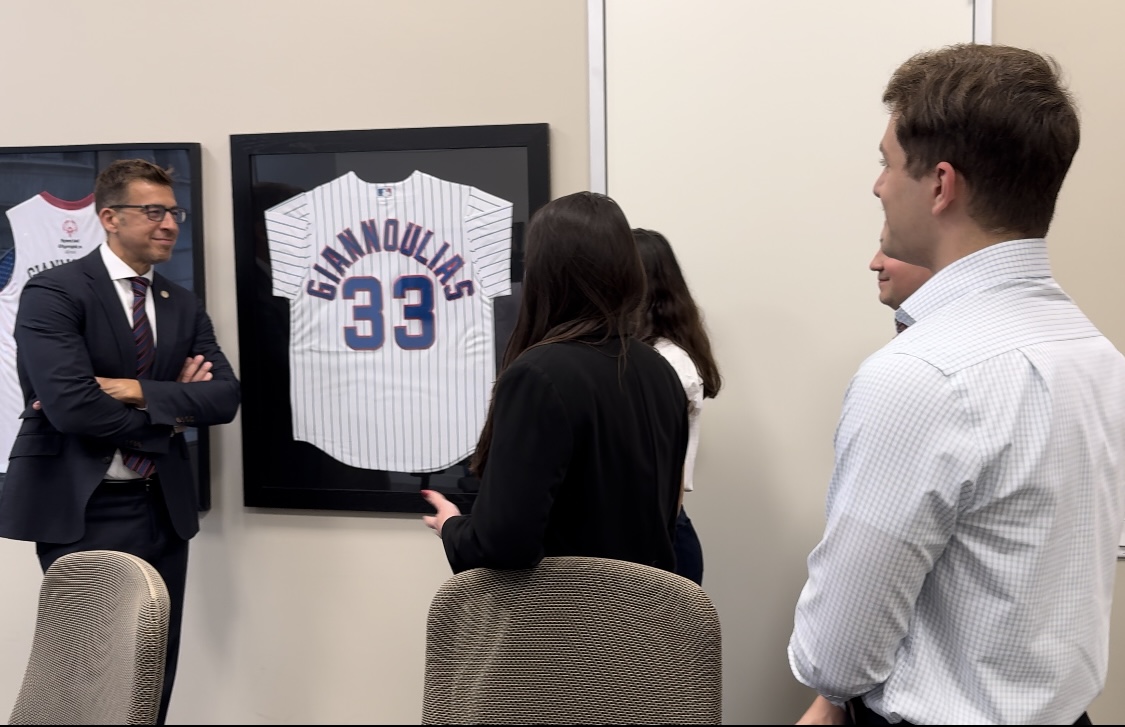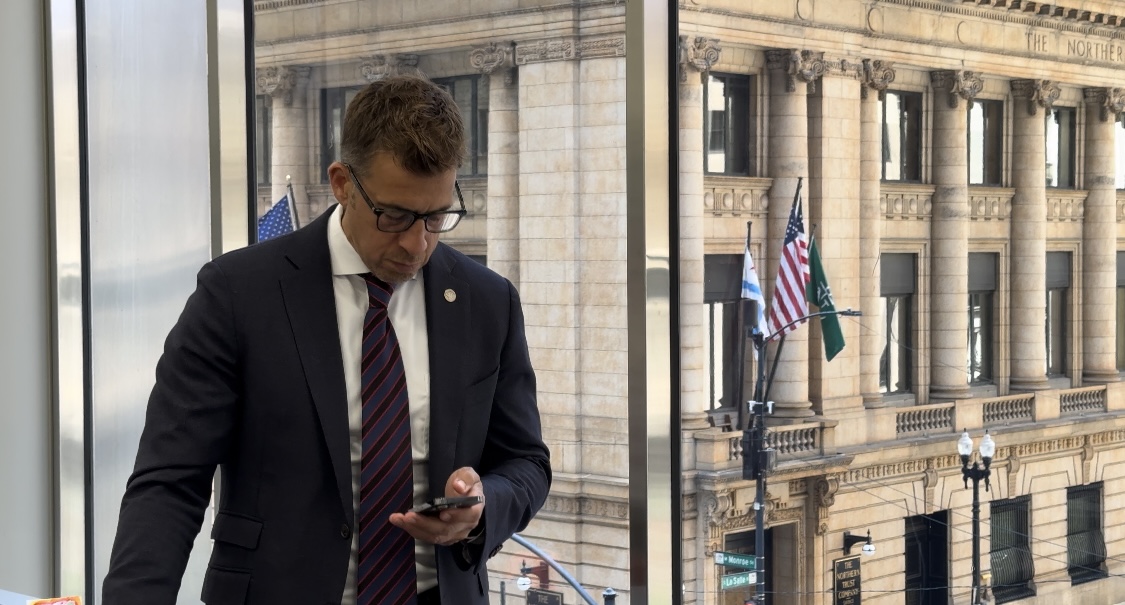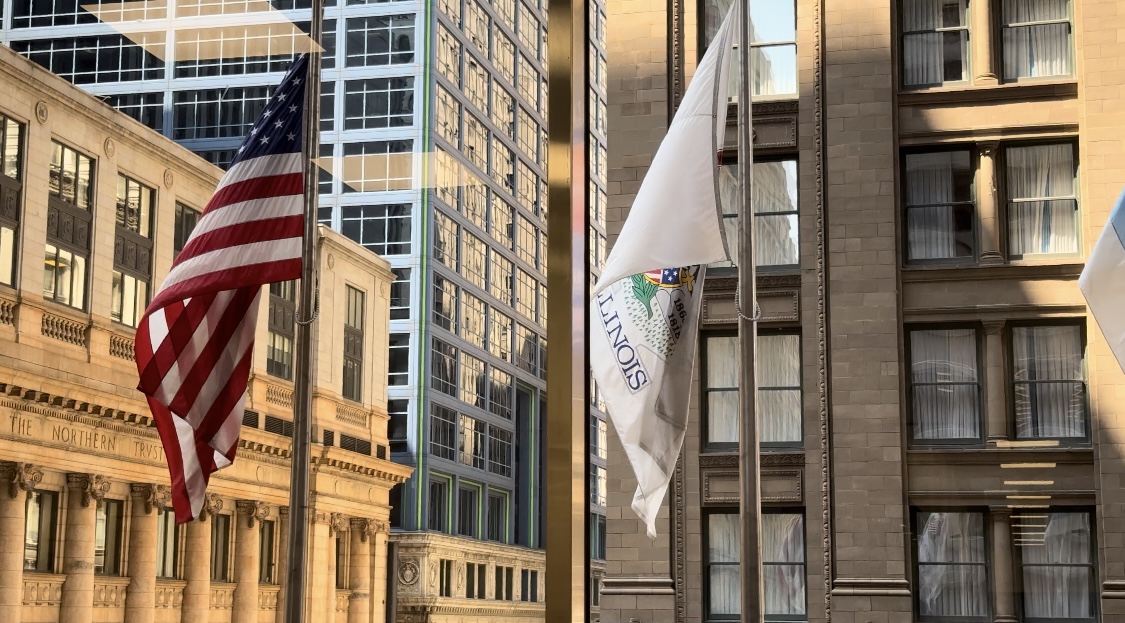Illinois Secretary of State Alexi Giannoulias faces a pivotal challenge. He prepares to oversee upcoming U.S. elections amid unprecedented disinformation and deepening polarization.
“American democracy is especially vulnerable to the flames of disinformation and distrust,” he said in an interview with To Vima, characterizing former president Donald Trump as “the chief arsonist” in this ongoing crisis.
Giannoulias, a former state treasurer and Democratic protégé of President Obama, emphasized that his office’s responsibilities remain clear, despite the rise of election conspiracy theories over the last four years.

State secretaries of state oversee crucial functions, from motor vehicle services in Illinois to business registration in Pennsylvania. However, their most important role may be as chief election officials, with scholars labeling them the “guardians of the democratic process.”
Many attribute the rise of election denial to Donald Trump, but skepticism about the legitimacy of elections existed even before 2016. What do you see as the deeper causes of this phenomenon, which seems so puzzling to many in other Western countries?
I think you are wrong to absolve Donald Trump. In 2011 he fueled conspiracy theories about President Obama’s birth and disingenuously offered $5 million to charity if it could be proven that President Obama was born on US soil. After the birth certificate was released, he not only failed to give the $5 million he continued his “birther” conspiracy all the way to 2014. He started a new “birther” conspiracy against Senator Cruz when they faced each other in the 2016 primary. When a celebrity turned President questions the legitimacy of the birth of his political rivals and his followers in turn believe him, it does not take much of an imagination to accept that these same followers would believe his questioning of the legitimacy of elections. American democracy is especially vulnerable to the flames of disinformation and distrust. But the chief arsonist is Donald Trump.
Historically, the Secretary of State position has been seen as more administrative. What additional responsibilities do you feel have fallen on your office as a result of the broader political landscape and concerns about election legitimacy?
Well, every secretary of state office (47 of 50 states have one) has different duties. Illinois has the largest Secretary of State’s office in the United States and outside of the Governor’s office, my office has the widest set of responsibilities and the most daily contact with voters. And let’s be clear, conspiracies about election legitimacy do not change the responsibilities of my office. We are making sure that Illinoisians have the chance to exercise their constitutional right to vote and elections are certified as required by law. It is conspiracy minded radicals – like those in Georgia – who are trying to change election procedures and the courts are striking down these moves.

In light of recent legal battles and disputes around elections nationwide, do you anticipate the need for federal reforms or support in protecting state-run elections?
Clearly everyone learned lessons from 2020. And since every state manages its own elections, each one is taking its own measures. Over the last two years we’ve seen special task forces, more election workers and volunteers being recruited, enhanced security for ballot boxes. Election officials are better prepared to battle disinformation and make the voters feel confident in the security and integrity of their vote.
The one person who has not learned for the better from 2020 is Donald Trump. His rhetoric is putting the lives of election workers in danger. Even Republican officials faced threats because of him. Federal action to battle disinformation is sorely needed – we saw this week that one disinformation site distributing deepfake videos was working directly for the Russian military’s intelligence service. But state officials need to be on guard and the federal government should give them support when needed.
Republicans claim new laws will improve safety and transparency, while Democrats argue they are efforts to suppress voters. Why is it so hard to find common ground on measures like photo IDs—ones that could build trust without discouraging minority and underprivileged voters?
Voter fraud is unacceptable in any case and is in fact illegal. Your question, however, ignores the fact that it is infinitesimally rare. After the 2020 election, The Associated Press contacted local election officials in six swing states and found only 475 POTENTIAL voter fraud cases out of the more than 25 million ballots that were cast in those six states. Lawsuits alleging voter fraud have failed time after time after time.

And we shouldn’t minimize the attempts to disenfranchise voters by labeling them merely as “discouraging”. In a country that needed multiple Constitutional Amendment and a Voting Rights Act to battle such efforts in the past, we have to be constantly vigilant in protecting the right to vote.
Donald Trump peddles lie after lie in order to gain power. He claimed that President Biden “controls the weather.” His Vice President – Mike Pence – does not support him. His former Chief of Staff calls him a “fascist”. We cannot dignify any of his lies as credible political debate.
Concerns have been raised about GOP plans to contest election results with organized partisan poll workers, party lawyers and friendly district attorneys, all documenting irregularities for potential court use. Given that this is the first coordinated effort of its kind in American political history, do you believe a very close election result could lead to an unprecedented political crisis?
Since you have a candidate who was complicit in trying to provoke a constitutional crisis on January 6, 2021 – an attack on democracy that he in effect celebrates today – and since he and his running mate leave the question over whether they will accept the results of the election, everyone concerned about such a crisis has every reason to be worried. We experienced a potential constitutional crisis in 2000, but when the Supreme Court ruled Vice President Al Gore put the country and American democracy ahead of his own political ambition. Donald Trump has neither the character nor the patriotism to do that.

You were named national honorary co-chair of Men4Choice, a group mobilizing men in support of abortion access. Some believe this issue played a key role in preventing the anticipated red wave in the 2022 midterms. Do you think it will have a significant impact on the swing states in the upcoming 2024 election?
The overturning of a woman’s constitutional right to an abortion not only prevented a red wave in 2022 but resulted in some unprecedented gains for a sitting President’s party in a midterm election. This is still a top issue for a significant number of voters because the overturning of Roe v Wade has been followed by several draconian measures in many states. Voters have learned the double talk by Donald Trump – who claims that he will just leave the issue to states – is exactly that: double talk. They know a national abortion ban is on the ballot. And they also know that a second Trump Administration will pursue the overturning of other constitutional rights.


